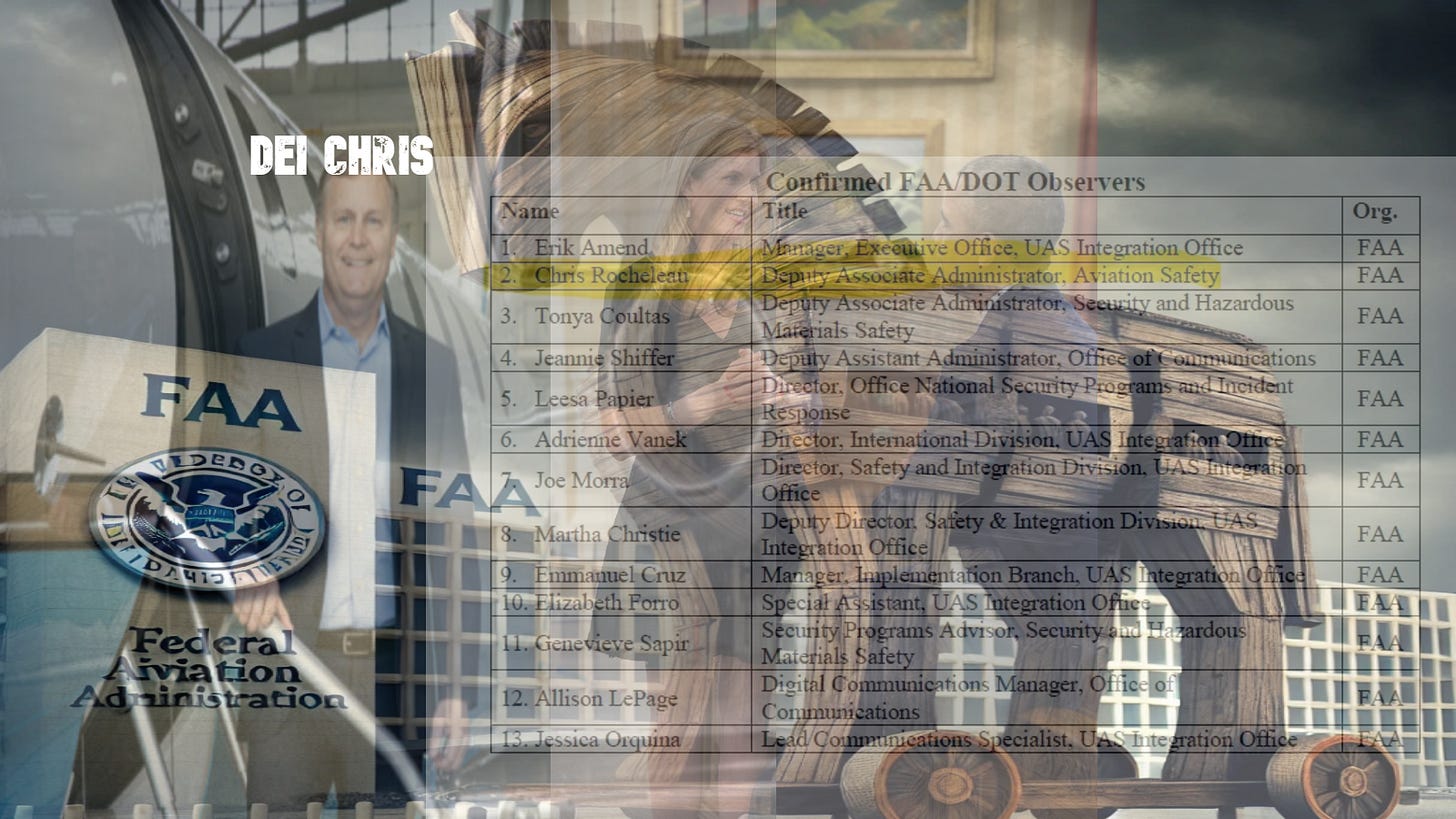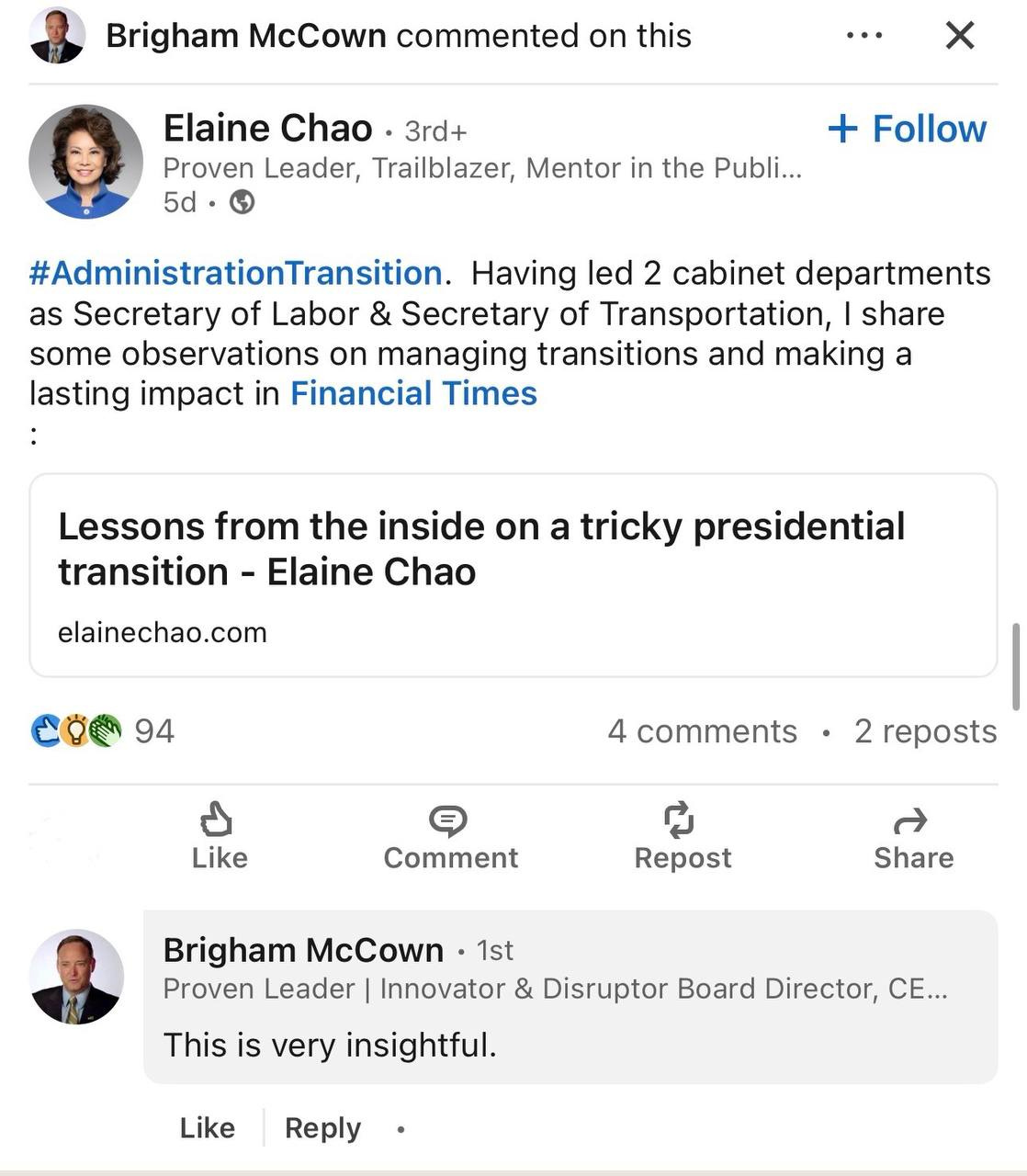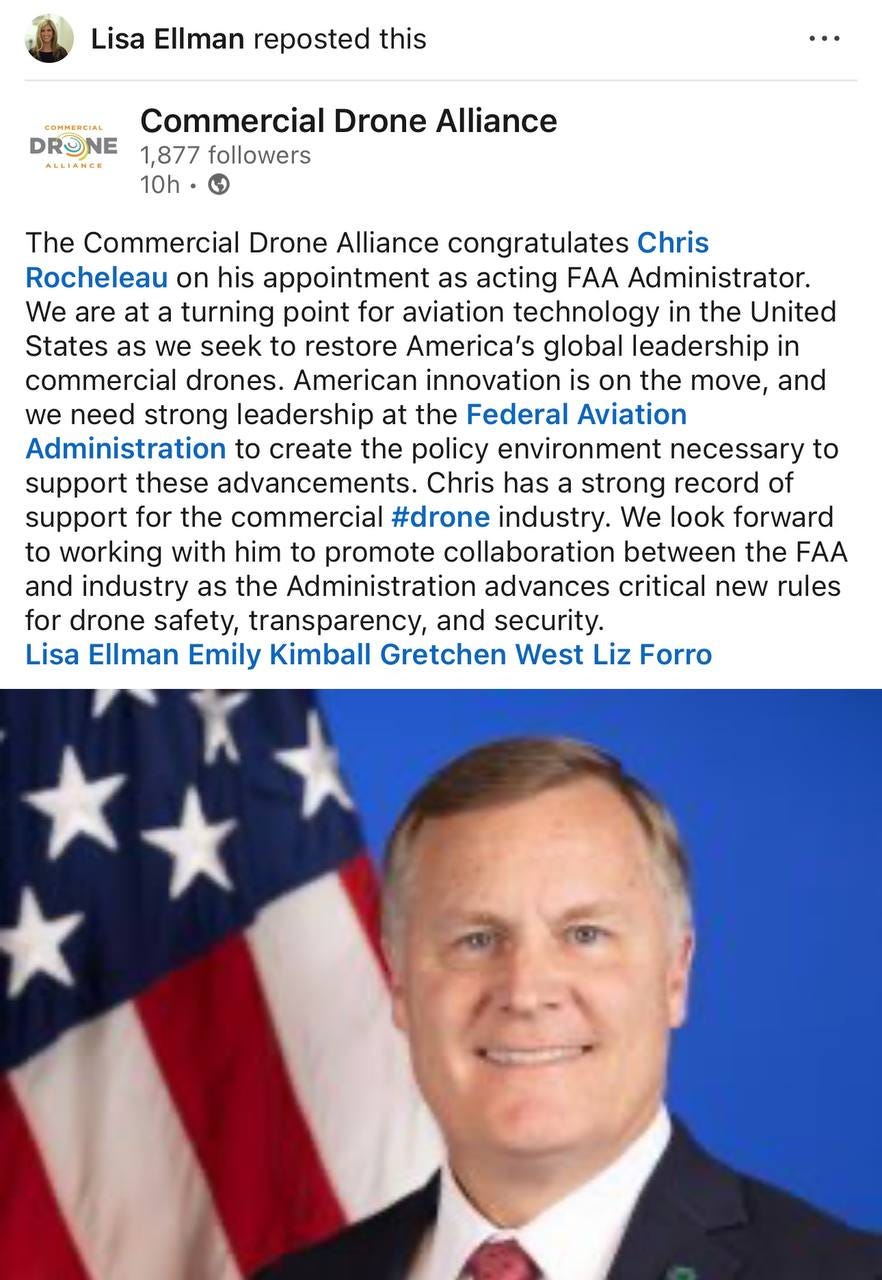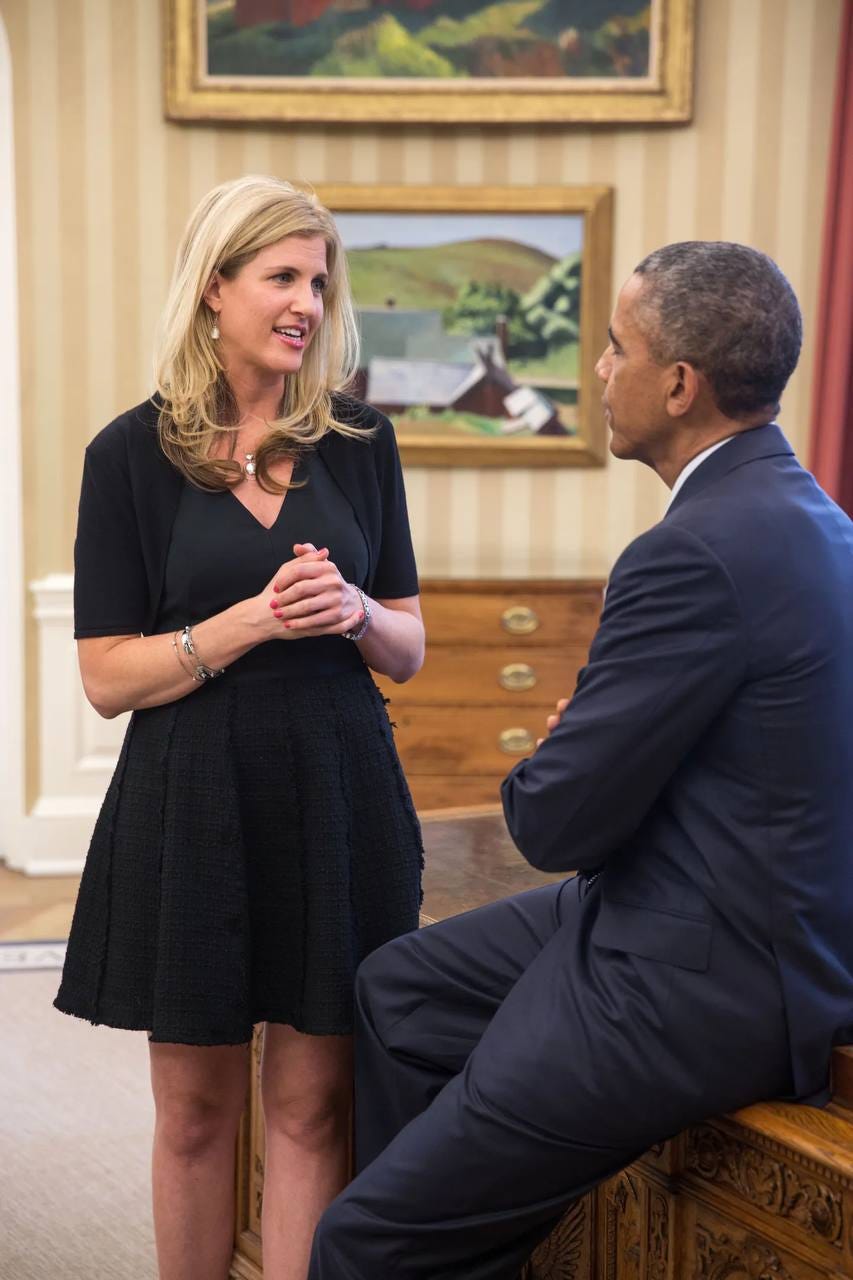The Trojan Horse at the FAA | DEI Chris Rocheleau and the Collapse of U.S. Aviation
Chris Rocheleau, a man who was not just part of the FAA bureaucracy but was one of its "FAA intelligence officers" when 9/11 happened—one of the greatest aviation failures in U.S. history.
The FAA is no longer serving the interests of American aviation—instead, it has become a bureaucratic weapon for globalist policies, DEI compliance, and political loyalty tests that undermine safety, innovation, and national security. At the heart of this crisis is Chris Rocheleau, a career bureaucrat whose tenure at the FAA has been marked by regulatory stagnation, allegiance to identity politics, and the preservation of the entrenched power structure. His appointment as Acting FAA Administrator is not about fixing the agency’s long-standing failures—it is about maintaining the status quo at the expense of American leadership in aviation.
When will we start putting American Interests first?
It’s a question that echoes through the hollow chambers of our institutions, where progress frequently grinds to a halt under the paralyzing weight of political loyalty. This isn’t just some abstract concern about partisanship or tribalism—it’s a deeply entrenched rot that undermines our industries and stalls our economy. It leaves our society ill-equipped for the challenges of tomorrow.
And nowhere is this more evident than in the repeated failures of government and regulatory bodies to foster sustainable innovation. Think about the Federal Aviation Administration’s (FAA) tepid approach to drone policy and advancements in aviation that prioritize American needs. Rather than establishing a progressive framework encouraging technological advancement, the FAA has been slow—almost reluctant—to implement reforms promoting the industry. Why? Because the current system is built to preserve the status quo and not disrupt it.
If political loyalty remains the currency of influence, innovation will always be left begging at the gates.
The Status Quo Is Why Our Nation is in Shambles
For too long, political loyalty has dictated policy priorities. Connections, favors, and ideological echo chambers have become more influential than visionary ideas grounded in science and expertise. This allegiance has perpetuated a complacent culture where industries rely on lobbying and relationships to nudge regulations in their favor—or, worse, block progress entirely.
Take, for example, the stagnation happening in the drone industry. The global potential of Unmanned Aerial Vehicles (UAVs) is staggering, from commercial uses like logistics and delivery to vital public services like disaster management. Yet, innovation in this space has been shackled in the United States. Regulatory barriers remain high, mainly because key players within the FAA appear more focused on preserving antiquated systems supported by entrenched interests than creating forward-thinking policies.
When President Trump announced Chris Rocheleau as the Acting FAA Administrator, it became immediately apparent that whoever orchestrated this decision was either woefully uninformed about the FAA’s long-standing structural failures or deliberately ensuring that one of the most entrenched figures of the unelected bureaucratic machine was elevated to a position of unchecked influence. I would bet money that Elaine Chao and Howard Lutnick lackeys like Brigham McCown are making such detrimental suggestions to President Trump. After all, Chao wrote a piece about taking Presidential Transition reigns, and Brigham loved it.
The Federal Aviation Administration has been plagued by institutional stagnation, regulatory overreach, and a revolving door of leadership prioritizing bureaucratic self-preservation over American aviation's safety, efficiency, and competitiveness for decades. Instead of selecting a bold reformer capable of breaking this cycle, Rocheleau's appointment signals an intentional reinforcement of the very system that has strangled American aviation innovation, delayed critical infrastructure upgrades, and prioritized globalist regulatory harmonization over U.S. air superiority.
Whether this recommendation stemmed from a genuine misunderstanding of the FAA’s deep-rooted issues or was an intentional maneuver by the shadowy fourth branch of government—the unelected bureaucracy—to install one of its most loyal enforcers, the result remains the same: the American people will pay the price. Rocheleau’s career is not one of reform but of entrenchment, ensuring that the agency remains beholden to international regulatory bodies, climate-driven policy constraints, and an institutional framework that serves political elites rather than the American public.
The Deliberate Sabotage of American Aviation: Corruption, Espionage, and the Betrayal Within the FAA
The United States is being strategically outmaneuvered in the drone and aviation sectors, and it is no accident—it is by design. While China, Turkey, and even emerging players in Africa aggressively expand their Unmanned Aerial Vehicle (UAV) industries, capitalizing on commercial logistics, military applications, and disaster response, U.S. innovation has been deliberately crippled. The regulatory barriers imposed by the FAA aren’t just bureaucratic inefficiencies—they are calculated obstacles designed to protect entrenched interests while allowing foreign adversaries to surge ahead.
At the heart of this stagnation is a web of industrial espionage, government complacency, and outright betrayal of American technological superiority. The ongoing black-market sale of U.S. aerospace and defense technologies—from Honeywell and Benchmark funneling gyroscopic navigation systems out of Dunseith, North Dakota, to China and other adversaries—exposes a deeper rot within our institutions. These systems, originally intended for U.S. military and commercial aviation, are now being tampered with, resold, and repurposed by hostile foreign entities, potentially compromising everything from missile guidance systems to military and civilian aircraft navigation. This has occurred under the watch of officials like North Dakota Governor Doug Burgum, whose inaction or complicity has allowed these illegal transfers to persist—a matter currently under active investigation.
Yet instead of addressing this national security crisis, we are installing Chris Rocheleau, a career bureaucrat with deep intelligence ties to the FAA’s post-9/11 operations, as the Acting FAA Administrator. This alone should send alarm bells ringing. Rocheleau was part of the FAA’s Intelligence Operations on September 11, 2001, which means he and his team were responsible for crafting the official narrative that followed. Suppose that monumental failure in aviation security was under his jurisdiction. Why would we place him in charge of the agency responsible for ensuring our airspace remains secure?
The answer is simple: because the failure is intentional. The unelected bureaucratic class has embedded itself so deeply within critical American institutions that it now actively works against U.S. interests—suppressing innovation, crippling industry leaders, and allowing adversaries to siphon our most sensitive technologies right out from under us. It’s as if we are at war with an enemy operating inside our government, and Chris Rocheleau is one of them.
We need knowledgeable, competent leaders—but not the same insiders who have spent decades systematically dismantling the FAA from within. The very survival of American aviation dominance, national security, and aerospace innovation depends on breaking the cycle of corruption, exposing the enablers of foreign espionage, and holding accountable those who have undermined our nation’s technological and military superiority for decades.
OBAMA'S PROTEGE
Lisa Ellman’s announcement confirmed everything I’ve been saying for years. I have warned about her influence time and time again, and everyone in the aviation industry knows that my concerns are 100% accurate. Her approach to drone policy is not about fostering American innovation or ensuring a competitive edge for the U.S.—it’s about consolidating control, catering to entrenched interests, and prioritizing global regulatory frameworks over national technological leadership. [BACKGROUND ARTICLE ON ELLMAN]
Her overbearing influence is impossible to ignore for those who have followed her career. She has positioned herself as the ultimate gatekeeper in drone policy, determining who gets to innovate and who gets left behind. But the real question is: Where do her loyalties indeed lie? Regarding Unmanned Aerial Systems (UAS) and aviation advancements, her decisions often align more with globalist initiatives and corporate power plays than independent American innovators' interests.
The drone industry has the potential to revolutionize commerce, defense, and infrastructure, but under Ellman’s watch, it has remained shackled by regulatory barriers that stifle competition and discourage breakthrough technologies. Instead of fostering an environment where entrepreneurs and engineers can thrive, she has ensured that only the most well-connected players can access the regulatory green light.
Even though Lisa Ellman is not officially in government, her influence over U.S. aviation policy is far more powerful than if she were, as she operates above the system—shaping regulations, controlling industry narratives, and dictating policy direction without the accountability of public office.
Her track record speaks for itself—whether through her deep ties to the Obama administration, her role in shaping drone regulations that overwhelmingly favor government oversight or her involvement in shaping international drone policy at the expense of American sovereignty. This is not someone advocating for innovation—this is someone ensuring that only a select few benefit from it.
Lisa Ellman’s role in drone policy isn’t just problematic—it is a direct threat to the future of U.S. aviation and technological independence. If her influence continues unchecked, the United States will fall further behind while foreign adversaries capitalize on the opportunities she has systematically obstructed at home.
The ongoing struggle between government risk aversion and American innovation is nothing new. Still, figures like Lisa Ellman and Chris Rocheleau have ensured that this conflict is not just bureaucratic inertia—it is a deliberate control strategy. These individuals dictate who gets a seat at the table, determining which advancements in drone technology and aviation policy can flourish and which are buried under layers of red tape, bureaucracy, and regulatory obstruction.
Ellman presents herself as an advocate for calculated risk and technological opportunity, but is her work about opening doors for American innovation, or is it simply a carefully curated narrative designed to maintain control, suppress independent growth, and reinforce a regulatory environment that benefits entrenched interests? Meanwhile, Chris Rocheleau, a man in FAA Intelligence on 9/11—the day of the greatest aviation security failure in U.S. history—has now been installed as the head of the agency responsible for aviation safety and oversight. His role in shaping the official narratives of that catastrophic event and subsequent cover-ups and failures should raise serious concerns.
Chris Rocheleau is a known Never-Trumper, and everyone at the DOT and FAA knows it—this is not a secret. Ted Cruz even called it out last year, openly stating that he would “let them tank” because of the FAA’s leadership failures under Pete Buttigieg’s revolving door policy. When I fired back at Cruz’s Chief of Staff, I made it clear that American lives were at risk because Buttigieg refused to hire a qualified candidate—especially a white man—to lead the FAA, leaving the agency rudderless and broken. Notably, Ellman was at the top of Pete's list despite having no experience in general aviation matters. The failures weren’t just incompetence—they were intentional.
Chris Rocheleau not only supported what Buttigieg did—he thrived under it. He is a full-blown DEI rider, fully embracing the identity politics-driven destruction of FAA leadership while ensuring that true aviation experts were sidelined in favor of unqualified hires. He loathes President Trump and has made it clear through his words, actions, and alliances. Texts and emails are proving his disdain for Trump, confirming that his loyalties lie with the bureaucratic class that has systematically weakened U.S. aviation. Now, Trump’s enemies have maneuvered him into power, further ensuring that the FAA remains an agency in chaos—one that prioritizes globalist policies and political ideology over aviation safety and American dominance.
Who benefits from a crippled FAA? The answer is not hard to see.
Keep reading with a 7-day free trial
Subscribe to Tore Says to keep reading this post and get 7 days of free access to the full post archives.







